
In a recent court ruling, pop icon Cher’s request for a temporary conservatorship over her son, Elijah Blue Allman, was denied. Cher filed for the order citing Elijah’s alleged substance abuse and mental health issues. However, Los Angeles Superior Court Judge Jessica A. Uzcategui concluded that Elijah had effectively managed his finances and remained drug-free. While Cher’s concerns about her son’s well-being were acknowledged, the court found that there was insufficient evidence to warrant a conservatorship.
Cher’s legal team highlighted Elijah’s ongoing struggles with addiction and his schizoaffective disorder, which leads to periods of psychosis. They expressed concern that his upcoming trust payment from his late father’s estate could potentially lead to drug use and endanger his life. However, Elijah’s attorneys argued that he had made significant progress in his recovery, attending meetings, receiving treatment, and reconciling with his estranged wife.
Judge Uzcategui acknowledged Cher’s concerns for Elijah’s well-being but concluded that much of the argument presented by Cher’s legal team was based on hypotheticals and fears. The judge emphasized that there was a lack of evidence to demonstrate that Elijah currently lacked the capacity to manage his own affairs. While the court did not grant a temporary conservatorship, it agreed to consider a larger, long-term conservatorship at a hearing scheduled for March.
Conservatorships are typically granted by a court to individuals who are unable to make their own decisions due to conditions such as dementia or mental illnesses. They can be used to manage a person’s financial affairs, personal affairs, or both. Cher’s concerns about Elijah’s mental health and substance abuse issues prompted her to seek legal intervention to protect him.
Alabama Barker: Seeking Prayers After Hospital Visit
Cher’s primary motivation in seeking conservatorship was to ensure Elijah’s well-being and safeguard his financial assets. She expressed immense love for her son and acted with his best interests in mind. Elijah receives regular distributions from the trust established by his late father, estimated to be around $120,000 a year. Cher’s concern was that these funds could be spent on drugs, leaving Elijah with no assets to provide for himself and potentially endangering his life.
Cher’s legal team argued that the support Elijah was receiving downplayed the severity of his mental health issues and substance abuse struggles. They contended that his apparent sobriety and stability were illusory, emphasizing his bipolar disorder diagnosis and periods of homelessness. They expressed concern that access to a significant amount of money could lead to a relapse and serious consequences for Elijah.
Elijah, alongside his attorneys, consistently denied the allegations made by Cher’s legal team. They maintained that he had successfully managed his income and expenses in recent weeks, refrained from illicit substances that had previously caused problems, and demonstrated stability in his life. Elijah stated that there was no emergency warranting a conservatorship and that he did not require the assistance his mother sought to provide.
Judge Uzcategui acknowledged Cher’s genuine concerns as a mother and recognized the overlapping issues of substance abuse and mental health that had affected Elijah in the past. However, she emphasized that concerns alone were not sufficient evidence to grant a conservatorship. The judge considered the lack of current evidence regarding Elijah’s incapacity to manage his affairs and the progress he had made in his recovery.
The court’s decision not to grant a temporary conservatorship means that Elijah will retain control over his finances for the time being. However, the court will reevaluate the case in March to determine whether a long-term conservatorship is necessary. This ruling highlights the complexities of conservatorships, particularly in cases where mental health and substance abuse issues are involved.
Cher’s case brings attention to the broader debate surrounding conservatorships, particularly in light of recent controversies surrounding Britney Spears’ conservatorship. The scrutiny surrounding the Spears case has prompted a reevaluation of the power dynamics and potential abuses within the conservatorship system. Cher’s request for conservatorship for Elijah has drawn public interest and raises questions about the balance between autonomy and protection for individuals with mental health challenges.
